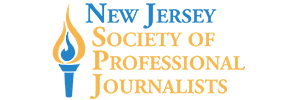 Armed with information I ripped from my copy of “Quill” magazine, a coupon for the airport shuttle bus and the EIJ15 app, I headed to my first Society of Professional Journalists’ Excellence in Journalism (EIJ) 2015 Conference in Florida last month.
Armed with information I ripped from my copy of “Quill” magazine, a coupon for the airport shuttle bus and the EIJ15 app, I headed to my first Society of Professional Journalists’ Excellence in Journalism (EIJ) 2015 Conference in Florida last month.
During my two-day stay, fellow NJ-SPJ member Jane Primerano (many thanks, Jane!) introduced me to people I knew only by their email addresses, Twitter accounts or bylines. I met SPJ’s Director of Membership Linda Hall and members from other SPJ chapters, including Dana Neuts (Washington state), J. Alex Tarquinio (New York), Sonny Albarado (Arkansas), Andy Schotz (Washington, D.C.) and Luther Turmelle (Connecticut).
The highlight of my time in Orlando? Meeting “60 Minutes” Correspondent Lesley Stahl in the hotel elevator as I walked to the Q&A featuring Stahl and ABC News’ Senior Justice Correspondent Pierre Thomas.
Stahl and “60 Minutes” have been a fixture in my house (and my mother’s house) for as long as I can remember. It sounds corny (and it is), but Stahl, along with Andy Rooney, Mike Wallace, Ed Bradley and Bob Simon felt like family members we saw every Sunday night at 7:00 p.m.
Highlights from the Q&A with Stahl and Thomas:
Lesley Stahl: “Read everything. You have to work harder than you have ever worked. You have to do it over and over again.”
Pierre Thomas: “While there is change in the form of what we do, the basics (of reporting) should not and must not change. We need to develop sources. We need to work those sources and we need to be sure what we’re reporting that we believe (as best we can), it is accurate. We must be consistent because no matter what the platform is, that is what you do. Apply the same standards.”
Session on Comments Sections
While I gathered information and insights from various sessions, the “To Comment or Not to Comment” program resonated with me personally.
As a contributor to a website with an online comments section, I have been on the receiving end of anonymous ad hominem remarks.
During the presentation, Marie K. Shanahan, assistant professor of journalism, University of Connecticut, and Natalie Jomini Stroud, associate professor of communication studies, University of Texas at Austin, and director, Engaging News Project, discussed how newspapers managed uncivil online comments made in the “Comments” section of their websites.
Shanahan and Jomini Stroud found that pseudonyms used by online commenters enabled them to be “bad actors.” While a moderator can get rid of uncivil comments, it takes time. Many news organizations have eliminated their online comments sections and use social media.
Takeaways based on Shanahan and Jomini Stroud’s Research:
Incivility in the comments can affect what people take away from your journalism.
Reporter engagement reduced incivility.
Reporters should ask online commenters follow-up questions and share information (e.g., links) when they respond to their comments.
When online commenters went through a log-in process using their real IDs and Facebook or other social media accounts, there were more civil comments.
The comments section design impacts the type and tone of comments.
The more informal the website design and its language, the more likely the comments will be uncivil.
My impression of my first EIJ Conference? Passionate and dedicated people are keeping journalism alive, despite the changes that have impacted this industry.

Be the first to comment on "My EIJ 1.0"